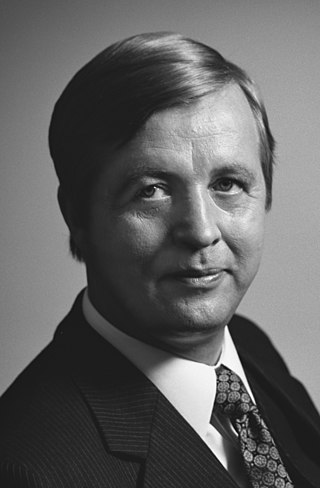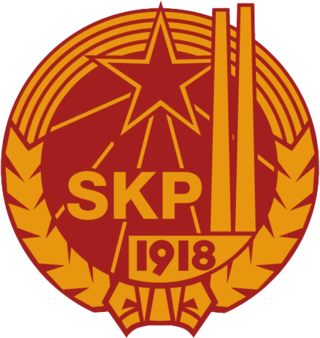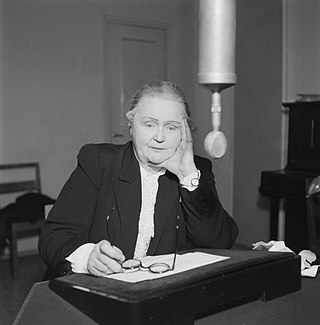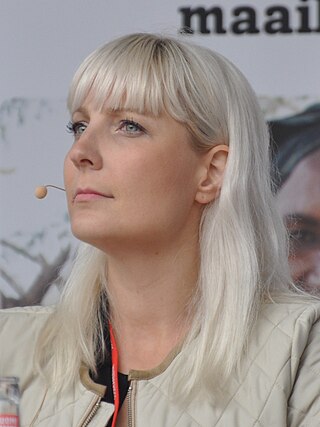
The politics of Finland take place within the framework of a parliamentary representative democracy. Finland is a republic whose head of state is President Alexander Stubb, who leads the nation's foreign policy and is the supreme commander of the Finnish Defence Forces. Finland's head of government is Prime Minister Petteri Orpo, who leads the nation's executive branch, called the Finnish Government. Legislative power is vested in the Parliament of Finland, and the Government has limited rights to amend or extend legislation. The Constitution of Finland vests power to both the President and Government: the President has veto power over parliamentary decisions, although this power can be overruled by a majority vote in the Parliament.

Taisto Kalevi Sorsa was a Finnish politician who served as Prime Minister of Finland three times: 1972–1975, 1977–1979 and 1982–1987. At the time of his death he still held the record for most days of incumbency as prime minister. He was also a long-time leader of the Social Democratic Party of Finland.

Erkki Sakari Tuomioja is a Finnish politician and has previously been a member of the Finnish Parliament. From 2000 to 2007 and 2011 to 2015, he served as the minister for foreign affairs. He was president of the Nordic Council in 2008.

The Communist Party of Finland was a communist political party in Finland. The SKP was a section of Comintern and illegal in Finland until 1944.
The National Progressive Party was a liberal political party in Finland from 1918 to 1951. The party was founded 8 December 1918, after the Finnish Civil War, by the republican majority of the Young Finnish Party and the republican minority of the Finnish Party

The Finnish Security and Intelligence Service, formerly the Finnish Security Police and Finnish Security Intelligence Service, is the security and intelligence agency of Finland in charge of national security, such as counter-intelligence and counter-terrorism, under the jurisdiction of the Ministry of the Interior. The agency had a distinct role during the Cold War in monitoring communists as well as in the balance between Finnish independence and Soviet appeasement. After the 1990s, Supo has focused more on countering terrorism and in the 2010s, on preventing hybrid operations.

Eero Olavi Heinäluoma is a Finnish politician who has been serving as Member of the European Parliament since 2019. A former chairman of the Finnish Social Democratic Party, he was replaced in the party's leadership by Jutta Urpilainen in June 2008. He was Speaker of the Parliament of Finland 2011–2015.

Helsinki is one of the 13 electoral districts of the Parliament of Finland, the national legislature of Finland. The district was established as Helsinki City in 1954 from parts of Uusimaa Province. It was renamed Helsinki in 1997. It is conterminous with the municipality of Helsinki. The district currently elects 23 of the 200 members of the Parliament of Finland using the open party-list proportional representation electoral system. At the 2023 parliamentary election it had 546,375 registered electors.

Hella Wuolijoki, also known by the pen name Juhani Tervapää, was an Estonian-born Finnish writer known for her Niskavuori series.

Sakari Severi Tuomioja was a Finnish politician and diplomat who served as Prime Minister of Finland between 1953–1954 and as Minister for Foreign Affairs between 1951–1952 and as the Governor of the Bank of Finland between 1945–1955. He was also Finland's ambassador in London and Stockholm.
Peace opposition was a Finnish cross-party movement uniting both bourgeois politicians like Paasikivi, Kekkonen, Sakari Tuomioja etc. and social democrats, aiming at stepping out of the Continuation War and finding a way to conclude peace with the Soviet Union. The number of MPs belonging to this group was rather small at first, but it gained influence as the military situation worsened. After the signing of armistice, Paasikivi established his cabinet, which included members of the previous opposition group.
Parliamentary elections were held in Finland on 7 and 8 March 1954.
Tuomioja is a Finnish surname. It may refer to:
The chancellor of justice is a Finnish government official who supervises authorities', such as cabinet ministers', compliance with the law and advances legal protection of Finnish citizens. The chancellor investigates complaints against authorities' activities and may also start an investigation of his or her own initiative. The chancellor attends cabinet meetings to ensure that legal procedures and regulations are followed. The chancellor has wide-ranging oversight, investigative and prosecutorial powers.

Finland-Ethiopia relations are foreign relations between the Finland and Ethiopia. Both countries established diplomatic relations on July 17, 1959. Ethiopia is represented in Finland through its embassy in Stockholm, Sweden. Finland has an embassy in Addis Ababa.
Kekkonen's fifth cabinet was the 39th government of Finland. The cabinet existed from 20 October 1954 to 3 March 1956. It was a majority government. Prime Minister Urho Kekkonen was elected the President of Finland on February 15 February 1956, resigning as Prime Minister and dissolving the cabinet in the process.

The Social Democratic Party of Finland is a social democratic and pro-European political party in Finland. It is the third largest party in the Parliament of Finland with 43 seats. Founded in 1899 as the Workers' Party of Finland, the SDP is Finland's oldest active political party and has a close relationship with the Central Organisation of Finnish Trade Unions. It is also a member of the Party of European Socialists, Progressive Alliance, Socialist International and SAMAK.
Walto Wihtori Tuomioja was a Finnish lawyer, journalist and politician. At first active in the Young Finnish Party, he was a member of the Parliament of Finland from 1924 to 1929 and again from 1930 until his death in 1931, representing the National Progressive Party. Tuomioja was the editor of Helsingin Sanomat from 1927 to 1931. He was the father of Sakari Tuomioja and the grandfather of Erkki Tuomioja.

Presidential elections were held in Finland on 28 January 2018. The incumbent Sauli Niinistö received 63% of the vote and was elected for a second term, avoiding a second round. He received a plurality of the vote in every municipality and a majority in all but 13 municipalities.
Katja Pehrman is a Finnish diplomat. She has been the Finnish OSCE Ambassador since 1 September 2013 and chaired by the Human Dimension Committee in 2016. She started working for the Ministry for Foreign Affairs in 2002.












